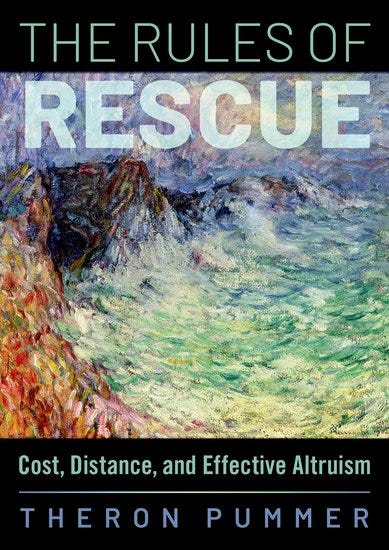Theron Pummer (University of St. Andrews), "The Rules of Rescue: Cost, Distance, and Effective Altruism"
Oxford University Press, 2022
My book, The Rules of Rescue is out! It’s Open Access, so you can download a PDF for free.
The book deals with a host of questions that have bothered me for a long time. What costs are we morally required to incur to rescue strangers? Is failing to assist distant people in need morally like letting nearby people drown? When do the needs of the many outweigh the needs of the few? When is altruism praiseworthy?
I defend a novel picture of the moral reasons and requirements to use time, money, and other resources to help others the most. It’s a non-consequentialist picture according to which there are significant permissions not to spend your life helping, as well as robust constraints against helping when it involves harming, lying, or stealing. Requirements to help are grounded not in the promotion of goodness per se, but in the prevention of serious harm to imperiled individuals, whether near or far.
I argue that altruistic activities are often constrained by requirements of effectiveness, to direct resources in ways that help more rather than less. I explore effectiveness in the context of what you’re required to do over the course of your whole life. I conclude that even if you’re not morally required to be an effective altruist, you may have to help as much as if you were one.
For more information, and links to blogs and podcasts, visit the book’s website: https://theronpummer.com/the-rules-of-rescue/
Click here to buy a printed copy, and here to buy an ebook (read aloud).







Very, very well done!
My beef with "Effective Altruism" (as a contemporary movement, rather than your sense of altruism that bears fruit) in its strong form at least is that it's probably misguided. I think their longtermism is a somewhat suspect concept and one probably shouldn't starve the present in order to feed a future that may never come to pass! We cannot predict with certainty future states of affairs in a complex phenomena like human society even twenty years out, much less one hundred years, and a thousand years out is beyond the predictive power of even concatenated exascale computers. So to take resources from the present's limited supply to address illnesses that may never arise whether we tend to them or not is beyond ineffective-- isn't it a fundamental misreading of causality in an environment of epistemic uncertainty?
Your approach seems much more realistic and congenial.
Really excited to see this book out